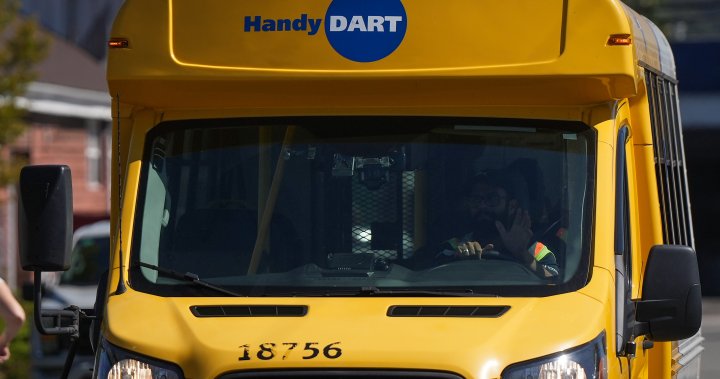The wheels of change are turning slowly for British Columbia’s HandyDART service, leaving advocates and opposition critics questioning the provincial NDP government’s commitment to its long-standing promise of bringing the essential transit service in-house.
Nearly seven years after Premier David Eby, then in opposition, championed the end of HandyDART privatization, the service remains under private operation through Texas-based Transdev. The specialized door-to-door transit service provides vital transportation for disabled and elderly residents who cannot use conventional public transit systems, making its operational status a matter of significant public interest across British Columbia.
“When you’re in opposition, it’s easy to make promises. When you’re in government, you have to make the tough decisions,” said Eric Doherty, a transportation planning consultant who has worked closely with HandyDART advocacy groups. “The NDP promised to bring HandyDART in-house, full stop. That hasn’t happened, and people are rightfully asking why.”
The issue gained renewed attention after TransLink announced in March that it had awarded a new contract to Transdev to continue operating the HandyDART service through 2026, with options for further extensions. This decision has intensified criticism from transit advocates who point to the NDP’s explicit 2017 pre-election commitment to end the privatization model.
BC Transportation Minister Rob Fleming defended the government’s progress, telling reporters that significant improvements have been made to HandyDART service despite the continued privatization. “We’ve increased trip availability by over 30 percent since taking office and improved the quality of service for users,” Fleming said. “The transition to a public model requires careful planning to ensure no disruption in service.”
However, documents obtained through Freedom of Information requests suggest that multiple opportunities to transition the service have passed without action. A 2019 TransLink report outlined a feasible path to bringing HandyDART in-house by 2022, but the recommendations were not implemented.
For users of the service, the debate goes beyond political promises. Margaret Spencer, who relies on HandyDART for medical appointments, expressed frustration with the current system. “When it’s run for profit, corners get cut. Drivers are underpaid, training is minimal, and the reliability suffers. We were promised better,” she said.
HandyDART workers have similarly voiced concerns about working conditions under the privatized model. According to ATU Local 1724, which represents HandyDART employees, wages remain significantly lower than those of conventional transit operators despite the specialized training required for assisting passengers with disabilities.
“The government talks about equity and accessibility, but their inaction on HandyDART privatization contradicts those values,” said Mark Beeching, president of the ATU local. “Our members provide an essential service to the most vulnerable transit users, yet they’re treated as second-class workers under this privatized system.”
The BC Liberal opposition has seized on the issue, characterizing it as another broken promise by the NDP. “They campaigned on bringing HandyDART in-house, formed government, and then conveniently forgot about that commitment,” said Opposition Transportation Critic Dan Davies. “It’s a pattern we’ve seen repeatedly with this government.”
Transportation analysts note that the debate reflects broader questions about the role of private companies in public transit. While privatization can sometimes reduce costs, critics argue it often comes at the expense of service quality and worker conditions. Several municipalities across Canada have moved away from privatized models for specialized transit services in recent years, citing improved accountability and service integration.
The debate over HandyDART’s future comes amid growing attention to accessibility issues in public transportation. With British Columbia’s aging population, demand for accessible transit options is projected to increase substantially over the coming decade.
As the contract with Transdev continues through at least 2026, the question remains: will the provincial government finally deliver on its promise to end HandyDART privatization, or will political expedience once again delay action on a service that thousands of vulnerable British Columbians depend upon daily?










